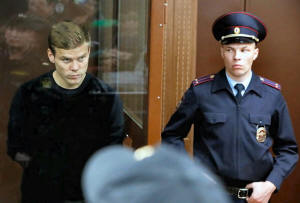|
Russian soccer players' arrests help divert attention from Putin's
problems
 Send a link to a friend
Send a link to a friend
 [October 19, 2018]
By Andrew Osborn [October 19, 2018]
By Andrew Osborn
MOSCOW (Reuters) - Two soccer players
arrested over violent attacks in Moscow are not the first rich and
famous Russians to get into trouble after mixing alcohol and
strippers.
But their harsh treatment and public shaming after an outcry over
the attacks is highly unusual and some critics of the Kremlin say it
is using the case of Alexander Kokorin and Pavel Mamayev to deflect
attention from bigger problems.
With the glow of President Vladimir Putin's March re-election win
gone, his ratings hit by an unpopular pension reform and the buzz of
hosting the soccer World Cup over, the Kremlin has the difficult
task of trying to distract and appease what polls show is an
increasingly disgruntled populace.
Kokorin and Mamayev, who both play in Russia's top league, will be
held in custody for two months over the attacks and both could face
lengthy jail terms.
CCTV footage circulated by Russian police shows a man being kicked
and punched by a group of people and another incident in which two
civil servants appear to be assaulted in a cafe.

The two players were present at both incidents after celebrating a
decade of friendship in a Moscow strip club where they said they had
been drinking beer.
Mamayev has admitted committing assault, but denied the more serious
charge of hooliganism. "As regards the assault I apologize and ask
the forgiveness of the victims," Mamayev told a judge on Friday.
Kokorin has also apologized. His lawyer has not challenged the
assault charge but is contesting the more serious charge of
hooliganism.
"I repent," Kokorin told a court on Oct. 11. "My behavior was
unacceptable and I will do everything to deserve forgiveness."
The story overshadowed embarrassing Western accusations about failed
Russian spies for several days.
"The footballer hooligans carried out a priceless public relations
service for the Kremlin," wrote Alexander Plushev, a presenter on
the Ekho Moskvy radio station, which gives air time to speakers who
are critical of the authorities.
"It's like the protagonists of this scandal have been chosen by a
great director: famous footballers, but not from the Russian team
side that we liked so much at the recent World Cup. Arrogant guys
who are not poor -- the ideal target for the man in the street's
displeasure."
An opinion poll conducted by state pollster VTsIOM showed that 86
percent of Russians had heard of the scandal, and that 55 percent of
those who knew about it considered the two players guilty, and that
only 6 percent of those asked thought they should not be punished.
The case has given people the illusion that their opinion counts,
Ekho Moskvy's Plushev wrote in a column, saying people had been
given the impression they could decide the men's fate.
Dmitry Bykov, a prominent writer, said the Russian public had
enjoyed the show.
"The people are rejoicing," he wrote in Snob magazine. "They're
rejoicing in the same way they do when there's a battle against
privileges when their own life is not improving one iota but when
some really public figure is being publicly brought low and trampled
upon."
[to top of second column] |

Russian soccer player
Alexander Kokorin, who was detained and accused of carrying out
attacks, attends a court hearing in Moscow, Russia October 11, 2018.
REUTERS/Sergei Karpukhin/File Photo

When asked if it had orchestrated a media campaign around the case
and whether the scandal had proved a useful distraction from other
more serious problems such as Kremlin candidates losing regional
elections, the Kremlin did not respond.
GLASS CAGES
Kokorin, 27, and Mamayev, 30, earn millions of dollars a year in a
country where the average wage is $8,000 per annum.
Zenit St Petersburg, where Kokorin plays as a forward, has said it
is considering how to punish him. Mamayev's club, Krasnodar, has
said it is exploring how to end his contract.
Police ordered the players to turn themselves in or be put on the
country's wanted list.
State television broadcast footage of them being questioned,
investigators opened a criminal case and a court jailed the pair for
two months pending trial. The players were shown sitting in glass
cages reserved for defendants in Russian court rooms.
If found guilty of charges of hooliganism and assault, they face up
to seven years in jail.
Three days after the incident, Putin signed a decree giving the two
civil servants attacked in the cafe top state awards. One of the
men, a senior civil servant with Asian roots, has accused the
players of racially abusing him.
Lawyers unaffiliated to the men say their treatment has been
unusually harsh and unlike other cases of alleged wrongdoing by
prominent members of society who critics say largely enjoy impunity.
When the head of parliament's international affairs committee was
accused of sexual harassment this year, an allegation he denied, the
Kremlin questioned the integrity of his female accusers and
parliament cleared him.
More serious cases, including when the defense minister's son ran
over and killed a woman on a pedestrian crossing in Moscow in 2005,
have also been swiftly closed.
The Kremlin often declines to comment on such cases but has
condemned the players' behavior.

"We've seen the pretty unpleasant video footage," Dmitry Peskov, a
spokesman for Putin, said of the players' case. "There were
obviously a lot of witnesses and it was captured on video. Law
enforcement authorities will have no trouble getting to the bottom
of what happened."
Asked by Reuters whether the Kremlin had told state media and the
police how to handle the case, he did not respond.
"They need to be made an example of and locked up," Vladimir
Solovyov, a high-profile journalist, said of the case. He called for
a five-year jail sentence.
"There won't be any girls, champagne or hookah pipes in prison," he
said.
(Editing by Timothy Heritage)
[© 2018 Thomson Reuters. All rights
reserved.] Copyright 2018 Reuters. All rights reserved. This material may not be published,
broadcast, rewritten or redistributed.
Thompson Reuters is solely responsible for this content. |